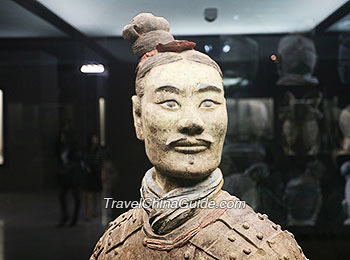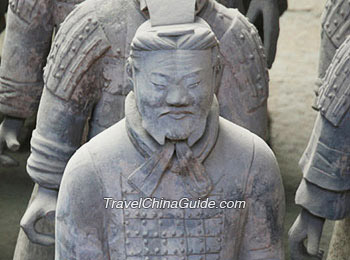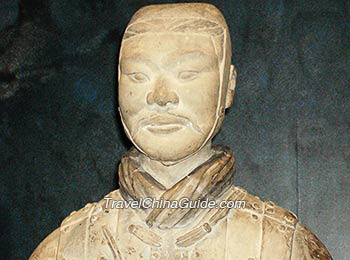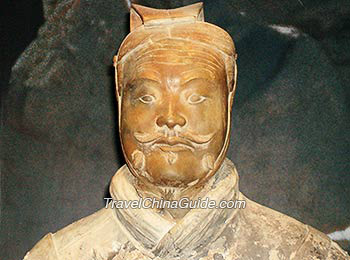Face Shapes of Terracotta Warriors
When visiting the Terracotta Army, you may find that the faces of the terracotta warriors are all different. Generally, they can be divided into eight basic shapes, “目” shape, “国” shape, “用” shape, “甲” shape, “田” shape, “由” shape, “申” shape, and “风” shape. The facial expressions of the warriors are also different from each other, some canny, some brave, some honest… to indicate their different characters and mental states.
Why the Faces of Terracotta Warriors Are All Different?
We cannot find two identical faces among the excavated terracotta warriors. This is from their making process. Although the heads are moulded, the artisans would then carve the details one by one manually, hence making them different.
![]() See How the Terracotta Warriors were Made
See How the Terracotta Warriors were Made
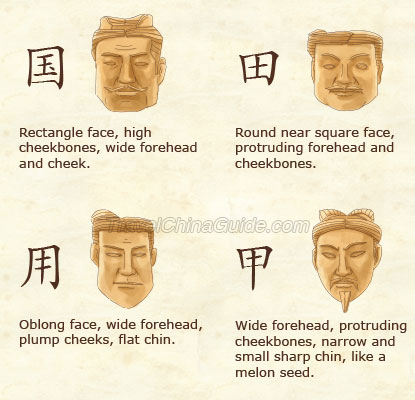
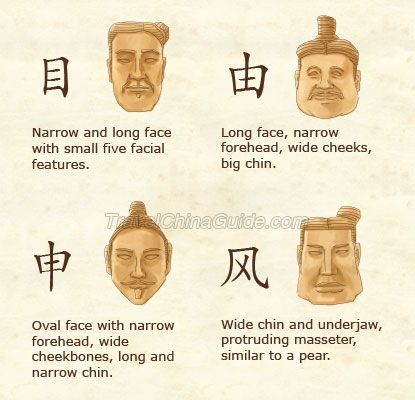
8 Basic Face Shapes of the Terracotta Warriors
“国” shape-face:
Characterized by rectangular face, high cheekbones, wide forehead and cheek, this “国” shape indicates fitness and strong body. It is the typical facial feature of Qin people, and you can find this kind of face commonly seen in the modern countryside of Shaanxi Province where the Terracotta Army is located.
“用” shape-face:
Marked by oblong face and flat cheek and chin, some “用” shape-face warriors have prolate face and wide forehead, thin brows and slender eyes, and looks very beautiful and consonant; some endearing warriors with this facial shape have plump cheeks, small mouth, and thin lips.
|
|
“田” shape-face:
It is a round shape face with protruding forehead, nose tip, and cheekbones while the parts of nose, eyes and mouth are sunken. Those warriors fabricated with this face shape are relatively shorter and wiry, with visible muscles and strong body.
“目” shape-face:
There are quite a number of “目” shape-faced warriors among unearthed terracotta warriors, and they have narrow and long face with small facial features. Thin eyebrows and lips, as well as the slender eyes are also the facial features of “目” shape face.
|
|
“甲” shape-face:
"甲” shape-face has wide top and narrow bottom, protruding cheekbones and small sharp chin, like the shape of a melon seed, which is the pretty shape recognized by Chinese people.
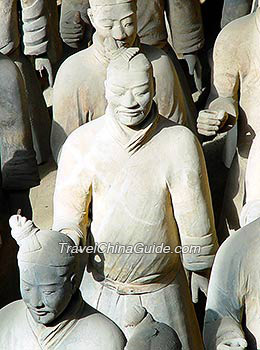 |
| "由" Shape Face |
“由” shape-face:
The “由”' shape-faced warriors with long face, narrow forehead, wide cheeks, and big chin are not many. Besides, the plump “由” shape-face was matched with small eyes.
“申” shape-face:
Modeling features of “申” shape-face: oval face with both narrow ends, slopping forehead, wide cheekbones and long chin. Almost all of the warriors with smiling '申' shape face have curved eyebrows and big eyes.
“风” shape-face:
“风” shape-face has wide chin and underjaw, and the masseter is protruding, with the similar shape of a pear.
Lifelike Facial Expressions of the Terracotta Warriors
All the eyeballs of the Qin terracotta warriors are simple a convex shapes. Eyes are regarded as the window to a man's heart so the artisans carved different eyes to represent the "inner world" of the different soldiers. Some soldiers have squinty eyes and a tender smile to show their confidence to win the war; some soldiers have eyes wide open in a fury, filled with hate toward their enemies; and some soldiers are looking down, shy and quiet. The soldiers looking forward have their eyeballs in the center of the eyelids, and those who looking up have the eyeballs titled up slightly. Also, the eyes of the Qin terracotta warriors depict a single eye-lid, which basically match the truth that the Qin army is mainly composed of the people who lived in the central Shaanxi plain.
Every Chinese Can Find a Similar Face in the Terracotta Army, Coincidence or Prediction?
Terracotta Warriors Tour: One-day to visit Terracotta Warriors and Horses and more
More Xi'an Tours
![]() Next: Green-Faced Terracotta Warrior
Next: Green-Faced Terracotta Warrior
